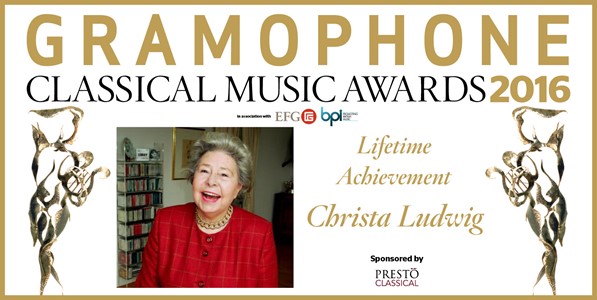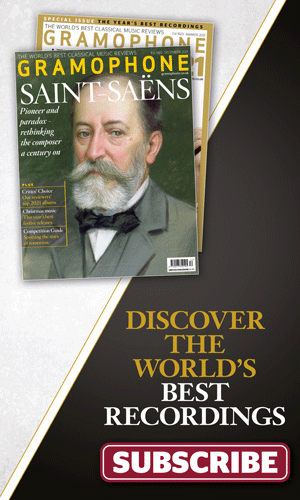Lifetime Achievement
Christa Ludwig
Mezzo-sopranos rarely make waves as sopranos or tenors do. It’s not in their nature. ‘I am a woman of the middle’ Christa Ludwig once observed. ‘What Eastern people call centred. Not extreme, either in my voice or my wishes, but happy with my lot.’ And if that sounds a touch conservative don’t be misled. As Ludwig’s shrewd, gossipy, technically insightful and intellectually robust memoir In My Own Voice (Limelight Editions: 1999) vividly reveals, hers is a life in which the lamb has happily cohabited with the lion during nine remarkable decades.
None of us can determine when we are born or what the fates have in store. When a fireball engulfed the small German town of Giessen in December 1944, the escaping Ludwig family must have wondered whether they were cursed or blessed. Yet the 16-year-old Christa was already blessed with a special talent. What’s more, both parents were singers who had forged careers and made mistakes from which their daughter would learn.
Her mother Eugenie Besalla was a gifted mezzo with a strong soprano register. Unfortunately, in Aachen in the 1930s she was obliged to ‘mix up her Leonores and her Sentas with her Ulricas and her Azucenas’. Thus she was denied what her daughter would later fashion: the bronzed beauty of a voice seamlessly joined across three registers.
Christa’s Viennese-born father had sung alongside Caruso at the Met but later turned to directing and the teaching of acting and public-speaking. Peerless diction and a first-hand knowledge of stagecraft would be other hallmarks of Christa’s art, learned from her parents and from two great modernist directors in post-war Darmstadt, Harro Dicks and Gustav Rudolf Sellner.
In 1955, after a 24-year apprenticeship (Christa had begun warbling the Queen of the Night’s aria at the age of three), the call came from Vienna and the world was suddenly her oyster. At the Vienna State Opera they gave her trouser-roles, which she disliked, and Mozart for which she thought herself ill-suited, a wonderful Dorabella notwithstanding. What interested her were not androgynous boys such as Cherubino, Octavian and Strauss’s young Composer but mature women wrestling with life’s dilemmas: Kundry and the Dyer’s Wife, the Marschallin and Leonore.
As a mezzo-soprano Ludwig never had the wider public profile of a Callas or a Vickers, though she sang with both and revered their gift for becoming the characters they played. In 1960 Walter Legge cast her as a youthfully impetuous Adalgisa to Callas’s Norma; in 1962 he chose her to sing opposite Vickers in the famous Klemperer recording of Fidelio. She was Kundry to Vickers’s Parsifal and Carmen to his Don José, for which she still bears the scar. (Vickers actually stabbed her in the final scene.)
And did the trinity of great conductors – Böhm, Karajan, Bernstein – with whom she famously worked leave similar scars, as tabloid journalism would have us believe? The very reverse. If we are moved to say of Christa Ludwig ‘we shall not look upon her like again’ it is in part because of the symbiotic yet at the same time independent-minded relations she enjoyed with these great theatre-conductors, with their deep understanding of the possibilities of the voice and their matchless knowledge of the operas they conducted. To discover the secrets of their individual cuisines, you must read Ludwig’s book. Yet as colleagues they were complementary. Bernstein may have brought Ludwig to the Marschallin but to hear her Marschallin in all its glory it’s to the unforgettable live 1969 Salzburg Festival performance conducted (and how!) by Böhm that we must turn.
Ludwig was a great Mahler singer even before the Mahler revival of the 1960s: witness her memorable 1958 recording of Kindertotenlieder with André Vandernoot. Yet it was Bernstein, she says, who later took her inside the music. He was also a rock in the early 1970s when the menopause played havoc with her all too vulnerable vocal chords. Karajan also kept faith, giving her, among other things, the chance to contribute a peerless Suzuki to a famous 1974 studio recording and film of Madama Butterfly.
Fricka and Waltraute (a treasured cameo) stayed with her to the end, joined by such charismatic oldies as Poulenc’s Carmelite Prioress and Strauss’s Klytemnestra. After seeing her Klytemnestra at the Met in 1984, Peter Conrad wrote, ‘A three-volume biography of this woman was realised physically by Ludwig in the 25 minutes of life Strauss allows her’.
No mezzo-soprano has married beauty of voice and intelligence of portrayal quite as Christa Ludwig has done in a repertoire that has embraced over 80 roles. Once during a curtain-call, as the audience raved and cheered, Karajan murmured, ‘If only they knew how good we really are’. Actually, I think we always knew how good Ludwig was. It was simply that there was never any need to shout it from the rooftops. Richard Osborne
The Lifetime Achievement Award is sponsored by Presto Classical
Photo of Christa Ludwig: Eamonn McCabe/Redferns

Gramophone Digital Club
- Digital Edition
- Digital Archive
- Reviews Database
- Events & Offers
From £9.20 / month
Subscribe
Gramophone Club
- Print Edition
- Digital Edition
- Digital Archive
- Reviews Database
- Events & Offers
From £11.45 / month
Subscribe
If you are a library, university or other organisation that would be interested in an institutional subscription to Gramophone please click here for further information.









